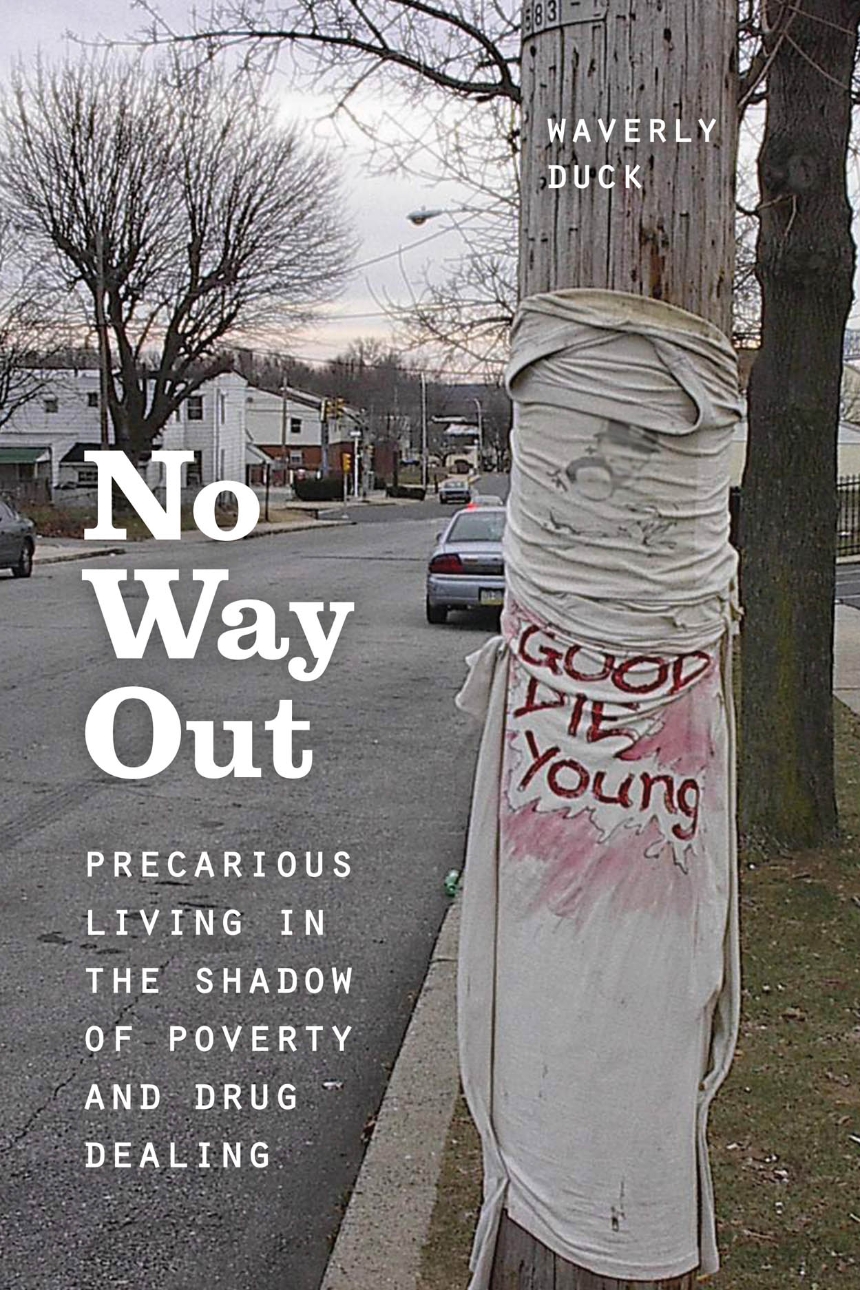No Way Out
Precarious Living in the Shadow of Poverty and Drug Dealing
In 2005 Waverly Duck was called to a town he calls Bristol Hill to serve as an expert witness in the sentencing of drug dealer Jonathan Wilson. Convicted as an accessory to the murder of a federal witness and that of a fellow drug dealer, Jonathan faced the death penalty, and Duck was there to provide evidence that the environment in which Jonathan had grown up mitigated the seriousness of his alleged crimes. Duck’s exploration led him to Jonathan’s church, his elementary, middle, and high schools, the juvenile facility where he had previously been incarcerated, his family and friends, other drug dealers, and residents who knew him or knew of him. After extensive ethnographic observations, Duck found himself seriously troubled and uncertain: Are Jonathan and others like him a danger to society? Or is it the converse—is society a danger to them?
Duck’s short stay in Bristol Hill quickly transformed into a long-term study—one that forms the core of No Way Out. This landmark book challenges the common misconception of urban ghettoes as chaotic places where drug dealing, street crime, and random violence make daily life dangerous for their residents. Through close observations of daily life in these neighborhoods, Duck shows how the prevailing social order ensures that residents can go about their lives in relative safety, despite the risks that are embedded in living amid the drug trade. In a neighborhood plagued by failing schools, chronic unemployment, punitive law enforcement, and high rates of incarceration, residents are knit together by long-term ties of kinship and friendship, and they base their actions on a profound sense of community fairness and accountability. Duck presents powerful case studies of individuals whose difficulties flow not from their values, or a lack thereof, but rather from the multiple obstacles they encounter on a daily basis.
No Way Out explores how ordinary people make sense of their lives within severe constraints and how they choose among unrewarding prospects, rather than freely acting upon their own values. What emerges is an important and revelatory new perspective on the culture of the urban poor.
Duck’s short stay in Bristol Hill quickly transformed into a long-term study—one that forms the core of No Way Out. This landmark book challenges the common misconception of urban ghettoes as chaotic places where drug dealing, street crime, and random violence make daily life dangerous for their residents. Through close observations of daily life in these neighborhoods, Duck shows how the prevailing social order ensures that residents can go about their lives in relative safety, despite the risks that are embedded in living amid the drug trade. In a neighborhood plagued by failing schools, chronic unemployment, punitive law enforcement, and high rates of incarceration, residents are knit together by long-term ties of kinship and friendship, and they base their actions on a profound sense of community fairness and accountability. Duck presents powerful case studies of individuals whose difficulties flow not from their values, or a lack thereof, but rather from the multiple obstacles they encounter on a daily basis.
No Way Out explores how ordinary people make sense of their lives within severe constraints and how they choose among unrewarding prospects, rather than freely acting upon their own values. What emerges is an important and revelatory new perspective on the culture of the urban poor.
Read an excerpt: "The Lyford Street Drug Market".
192 pages | 6 x 9 | © 2015
Political Science: Urban Politics
Sociology: Criminology, Delinquency, Social Control, Race, Ethnic, and Minority Relations, Urban and Rural Sociology
Reviews
Table of Contents
Preface
Introduction: Precarious Living
ONE / Jonathan’s World
TWO / Drug- Dealing Careers
THREE / The Rise and Fall of Lyford Street
FOUR / Snitching, Gossip, and the Power of Information
FIVE / The Politics of Murder and Revenge
SIX / Collective Punishment: Black Men’s Reflections on Everyday Life in Bristol Hill
SEVEN / Benita’s Story: Coping with Poverty in the Age of Welfare Reform
Conclusion: Understanding Everyday Life in the Shadow of Poverty and Drug Dealing
Bibliography
Index
Introduction: Precarious Living
ONE / Jonathan’s World
TWO / Drug- Dealing Careers
THREE / The Rise and Fall of Lyford Street
FOUR / Snitching, Gossip, and the Power of Information
FIVE / The Politics of Murder and Revenge
SIX / Collective Punishment: Black Men’s Reflections on Everyday Life in Bristol Hill
SEVEN / Benita’s Story: Coping with Poverty in the Age of Welfare Reform
Conclusion: Understanding Everyday Life in the Shadow of Poverty and Drug Dealing
Bibliography
Index
